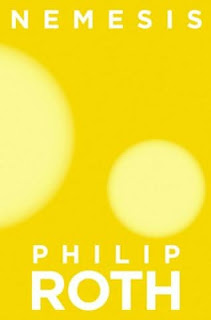One of my earliest memories is of watching the few toys I owned being destroyed in a barnyard fire set especially for that purpose. From what I have been told, the toys were burned in hope that I would not fall victim to polio, as had the little boy who had played with those toys and me only a few days earlier. My parents, I am sure, were terrified, and they felt that they had to do something. It was only a year or so later that I understood the whole story, but the experience is something that still crosses my mind every year or so.
Philip Roth’s latest novel, Nemesis, revisits those terrible days during which the general public had no idea how polio was spread and had to watch helplessly as countless children and young people were stricken. Set in a Jewish, Newark neighborhood in 1944, the book captures the feeling of panic and overwhelming despair that accompanied the regular arrival of that dreaded killer-disease.
Bucky Cantor, who was quite the high school athlete, is disappointed to find himself one of the very few able-bodied young men still walking the streets of his neighborhood. Even now, at the peak of World War II, Bucky’s eyesight is so bad that no branch of the United States military will accept him. As a way of serving his community, Bucky has taken on the responsibility of running the park where the neighborhood youngsters spend their summer days playing baseball or enduring rope-jumping marathons.
All goes well until one of those children is stricken by polio. That case is just the first of many and, before long, panic and finger pointing will begin. Bucky Cantor, a young man with high expectations of himself, will find himself torn between staying with the young teens who so much admire him or joining his girlfriend in employment at a prestigious children’s camp in the Poconos. His decision will change lives in a way he never imagined.

A chief strength of Nemesis is the vividness with which Roth recreates the impact of polio on the psyche of the country before Dr. Jonas Salk’s vaccine began to eradicate the disease in 1955. The book is, however, also an excellent character study of a young man who could never live up to his own expectations of personal behavior. Bucky Cantor’s high ideals, combined with the personal guilt he feels when he fails to match those ideals, make for a highly destructive combination of beliefs. Personal failure, always likely when the bar is set so high, would mean that, soon enough, Bucky would no longer have “a conscious he could live with.”
The inherent tragedy of Nemesis and a young man like Bucky Cantor is best summed up by another of the book’s characters who said about Bucky: “The guilt in someone like Bucky may seem absurd but, in fact, is unavoidable. Such a person is condemned. Nothing he does matches the ideal in him. He never knows where his responsibility ends. He never trusts his limits because, saddled with a natural goodness that will not permit him to resign himself to the suffering of others, he will never guiltlessly acknowledge that he has any limits.”
Bucky Cantor could not protect the park children from polio; even worse, he could not protect himself from failing to reach his own personal ideals.
Rated at: 4.0








